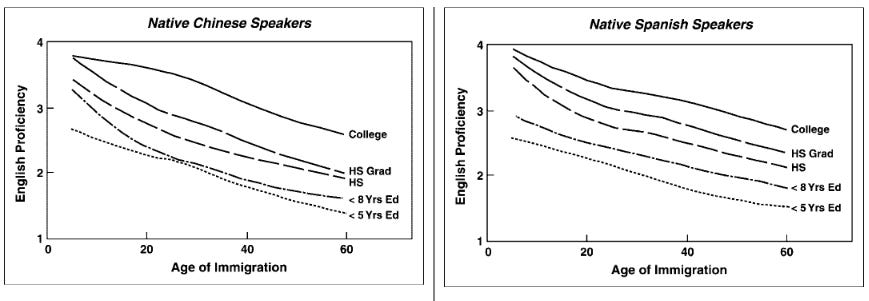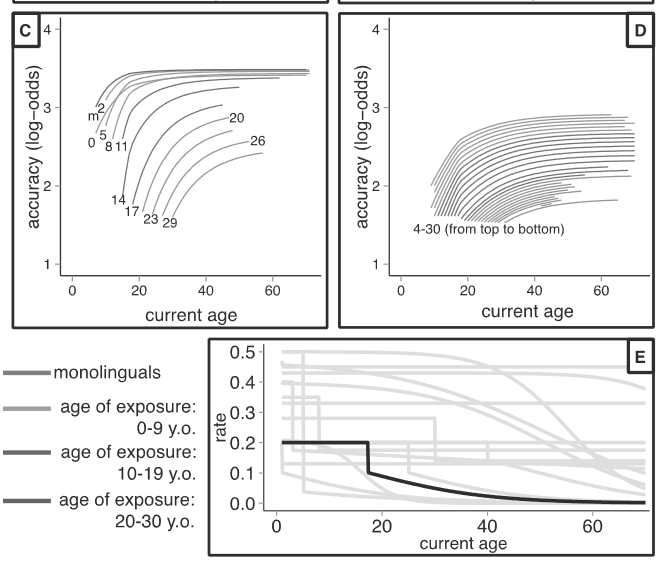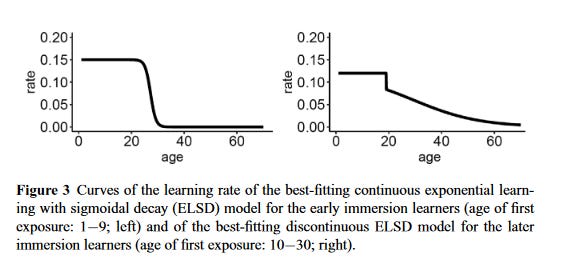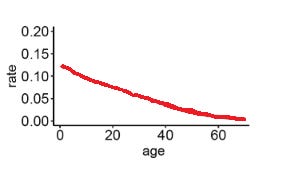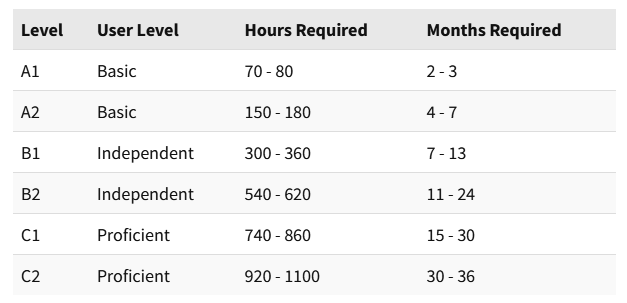Critical Periods For Language: Much More Than You Wanted To Know
Scott Young writes about Seven Expert Opinions I Agree With That Most People Don’t. I like most of them, but #6, Children don’t learn languages faster than adults, deserves a closer look. Some people imagine babies have some magic language ability that lets them pick up their first language easily, even as we adults struggle through verb conjugations to pick up our second. But babies are embedded in a family of first-language speakers with no other options for communication. If an English-speaking adult was placed in a monolingual Spanish family, in a part of Spain with no English speakers, after a few years they might find they’d learned Spanish “easily” too. So Scott says:
Is this true? My read is: scientists are still debating the intricacies, something like it is kind of true, but it’s probably not exactly true. There’s A Critical Period For First Language LearningThis isn’t really what anyone is asking, but it will help clarify some later questions: children need to learn some language before age 5 - 10, or they’ll lose the ability to learn languages at all. Older research on this topic focused on feral children like Genie, who had been abandoned or abused and so never learned language. They had a hard time learning language even after being reintegrated into society; most never succeeded. But skeptics argued these children had lots of other problems besides lack of language exposure; maybe the abuse and neglect damaged their brains. The situation was clarified by the discovery of Chelsea, who was born deaf in “a rural community”. Her family tried to get her support, but the process was bungled, nobody in her area knew sign language, and so she was raised without exposure to language (but otherwise normally). At age 32, social services “discovered” her, gave her hearing aids which made her hearing fully functional, and referred her to scientists who tried to teach her language. After ten years, she had a good vocabulary and a good understanding of the practicalities of communication, but was never able to develop anything like a normal grammar. (interestingly, she was fine at math, suggesting that grammar and numeracy are dissociable) Studies of other deaf people exposed to sign language or hearing aids at various ages suggest that waiting until age 5 to learn language is worse than starting at birth. I can’t find anything more specific about younger ages. The Younger You Start Learning A Second Language, The BetterThe typical study here looks at census records of tens of thousands of US immigrants and correlates when they immigrated with how good their English is. Here’s a typical finding (source): English proficiency declines based on age at entering the US. This isn’t a trivial finding. Previous research found that immigrants’ English proficiency asymptoted out after ten years, and the study authors limited their sample to immigrants who had been in the US longer than that. So we’re asked to believe this isn’t a function of how long each group has been in the US. Suppose everyone here has been in the US thirty years. People who enter the US at 10 (and are now 40) have better English than people who enter at 20 (and are now 50). Why? It seems like they must be able to learn languages better (or at least to a higher final level) when they’re younger. But this also doesn’t show a “critical window”. There is no single age where people go from “good at English” to “bad at English”. It’s just worse and worse over time. But would a critical window really produce a discontinuity on the graph? Suppose there was a window from 1 to 10. Someone who immigrated at 9 would get one year within the window (to learn faster and better than normal), and someone who immigrated at 10 would get zero years within the window. So they might not end up looking very different. It would just be a matter of slope, which might be easy to miss. Hartshorne, Tenenbaum, and Pinker do a big-data, fancy-statistics version of this experiment to investigate concerns like these. They got 600,000 bilingual English-speakers from around the world to complete a fun online quiz about their English grammar ability, and found the following: Language learning ability is high until about age 18, when it crashes. After that it keeps going down, but more gradually. I don’t think they’re claiming this is the exact curve, just that it fit better than a dozen or so alternatives they looked at. This is a weird result, not really predicted by any theory. The authors wonder if it’s related to people learning languages better while still in school. But this is a high-functioning sample and you would expect many of them to go to college. Also, many of these people are immersion learners, and it’s not obvious why school would be better for immersion learning than whatever comes after (eg the workplace). Van der Slik et al are so skeptical that they reanalyze the data with a different strategy for separating language learner strategies. They find that mostly non-immersion learners show the discontinuous pattern above, with monolinguals, bilinguals, and “early immersion learners” showing a more continuous pattern. This makes it clearer that the drop involves leaving school (where non-immersion learners are most likely to get language instruction). Their curves look like this:
Taken at face value, monolinguals and early immersion learners (ie those least dependent on school, the pattern on the left) learn language at a constant rate until their mid-twenties, when the rate suddenly (albeit “continuously”) drops. This is also a surprising result; although the authors don’t say so, I wonder if it is best explained by people already knowing the language pretty well by their mid-twenties and so not having much left to learn. I thought the original researchers adjusted for this by using log scores instead of raw scores, but I can’t otherwise explain why learning rate is so much higher in early-immersion 40 years olds compared to late-immersion 40 year olds. Could we just subtract out the effect of schooling from the late immersion learners to get a true rate?: Not really, this pattern shows less learning at eg age 20 than is observed by the early immersion learners. Aside from saying that learning rate seems high in youth, probably stays high for a while, and then seems to go down in some kind of plausibly-continuous way most marked between 20 and 30, I’m pretty stumped here. All of these models agree that there’s no special mystical reason why someone who starts learning at 30 can’t gain native-level proficiency. It’s just that thirty-year olds have low language learning rates. Let’s say it would take forty years of learning at that rate to gain native-level proficiency. Even if learners were willing to wait until age 70, by the time they were 50 they’d be only halfway, and their language learning rate would have decayed further, and now it would take more than twenty more years. So there’s some age at which reaching native proficiency becomes practically impossible for most people, based on learning rate and the human lifespan. Is this learning rate decline language-specific, or true of any task? The authors assume the former, but I don’t know why. These kinds of studies have not completely won the debate; see eg The Critical Period Hypothesis For [Second Language] Acquisition: An Unfalsifiable Embarassment? It doesn’t disagree with HTP exactly, just points out that its results are strange, contradict most prior definitions of “critical periods”, and probably wouldn’t naturally be thought of as a “critical period” if that term wasn’t already in popular use. Do Young People Learn Their First Language Faster Than Older People Can Learn A Second?This is closest to the original question. Here’s one language-learning site’s estimate for how long it would take a dedicated English-speaker to learn Spanish: …where C2 is an impressive level of fluency sufficient for eg difficult intellectual work. Meanwhile, 36-month-old Spanish children will still be barely saying their first complete sentences. Advantage: adults! This is obviously unfair since young children are very dumb and have to spend a year just learning to produce sounds at all, but I’m not sure what else it would mean to answer this question. Is There Something Going On Where Children Learn Better Implicitly, And Adults Learn Better By Explicit Rules?In a few studies (1, 2), if you try to teach adults and children the same fake language, adults learn faster whether it’s taught implicitly or explicitly. If I understand right, no evidence was found for children having a separate implicit language track adults lack access to. Are There Subparts Of Language That Definitely Work By Critical Windows?The strongest argument is for accent/pronunciation. In the standard theory, babies start out equally able to recognize all ~1000 possible phonemes, but soon pare them down to the ones included in their native language, and have trouble getting them back later (eg monolingual Asians who cannot distinguish “R” and “L”). This doesn’t seem to match experiment, where the “critical period” for having a perfect accent lasts until age 10 - 12. Also, sometimes talented people who try really hard can have good pronunciation even if they start after that time. I wonder if this is just the same phenomenon of declining learning rates observed by Pinker et al. SummaryChildren seem to be able to pick up second languages faster than adults. It’s hard to tell exactly when the learning rate slows, or to be sure this is a biological phenomenon instead of an effect of school ending or picking low-hanging fruits. Mastering a language perfectly in adulthood is hard, but maybe just because there’s not enough time to learn it at adult’s slower learning rates. Babies don’t seem any better than older children (eg 17 year olds), and are limited by being babies. The difference between their excellent ability to learn a first language, and (for example) a middle-schooler struggling to learn a second language, probably is just exposure and motivation, and not an additional magic language ability. You're currently a free subscriber to Astral Codex Ten. For the full experience, upgrade your subscription. |
Older messages
What Can Fetish Research Tell Us About AI?
Monday, August 21, 2023
Epistemic status: Ha ha, only serious
Open Thread 290
Monday, August 21, 2023
...
Your Book Review: The Mind Of A Bee
Friday, August 18, 2023
Finalist #14 In The Book Review Contest (cw: insect pics)
Bride Of Bay Area House Party
Thursday, August 17, 2023
...
In Defense Of Describable Dating Preferences
Wednesday, August 16, 2023
...
You Might Also Like
10 Things That Delighted Us Last Week: From Seafoam-Green Tights to June Squibb’s Laundry Basket
Sunday, March 9, 2025
Plus: Half off CosRx's Snail Mucin Essence (today only!) The Strategist Logo Every product is independently selected by editors. If you buy something through our links, New York may earn an
🥣 Cereal Of The Damned 😈
Sunday, March 9, 2025
Wall Street corrupts an affordable housing program, hopeful parents lose embryos, dangers lurk in your pantry, and more from The Lever this week. 🥣 Cereal Of The Damned 😈 By The Lever • 9 Mar 2025 View
The Sunday — March 9
Sunday, March 9, 2025
This is the Tangle Sunday Edition, a brief roundup of our independent politics coverage plus some extra features for your Sunday morning reading. What the right is doodling. Steve Kelley | Creators
☕ Chance of clouds
Sunday, March 9, 2025
What is the future of weather forecasting? March 09, 2025 View Online | Sign Up | Shop Morning Brew Presented By Fatty15 Takashi Aoyama/Getty Images BROWSING Classifieds banner image The wackiest
Federal Leakers, Egg Investigations, and the Toughest Tongue Twister
Sunday, March 9, 2025
Homeland Security Secretary Kristi Noem said Friday that DHS has identified two “criminal leakers” within its ranks and will refer them to the Department of Justice for felony prosecutions. ͏ ͏ ͏
Strategic Bitcoin Reserve And Digital Asset Stockpile | White House Crypto Summit
Saturday, March 8, 2025
Trump's new executive order mandates a comprehensive accounting of federal digital asset holdings. Forbes START INVESTING • Newsletters • MyForbes Presented by Nina Bambysheva Staff Writer, Forbes
Researchers rally for science in Seattle | Rad Power Bikes CEO departs
Saturday, March 8, 2025
What Alexa+ means for Amazon and its users ADVERTISEMENT GeekWire SPONSOR MESSAGE: Revisit defining moments, explore new challenges, and get a glimpse into what lies ahead for one of the world's
Survived Current
Saturday, March 8, 2025
Today, enjoy our audio and video picks Survived Current By Caroline Crampton • 8 Mar 2025 View in browser View in browser The full Browser recommends five articles, a video and a podcast. Today, enjoy
Daylight saving time can undermine your health and productivity
Saturday, March 8, 2025
+ aftermath of 19th-century pardons for insurrectionists
I Designed the Levi’s Ribcage Jeans
Saturday, March 8, 2025
Plus: What June Squibb can't live without. The Strategist Every product is independently selected by editors. If you buy something through our links, New York may earn an affiliate commission.
